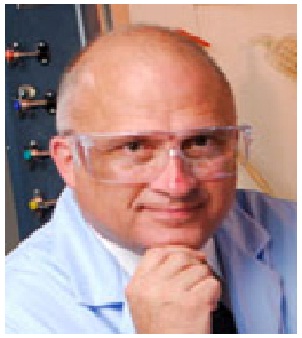Biography
Dr. Arthur Ragauskas held the first Fulbright Chair in Alternative Energy and is a Fellow of the International Academy of Wood Science and TAPPI. Dr. Arthur Ragauskas's research program at Georgia Institute of Technology is seeking to understand and exploit innovative sustainable bioresources. This multifaceted program is targeted to develop new and improved applications for nature’s premiere renewable biopolymers for biomaterials, biofuels, biopower, and bio-based chemicals. Currently, Dr. Ragauskas manages a research group of +27 graduate students, postdoctoral research fellows, a research scientist, and visiting scientists. Dr. Arthur Ragauskas has collaborative research projects with several GA Tech faculty and GA Tech team leader for Biological Energy Science Center (BESC) research efforts and team leader for an industrial consortium program titled Black Liquor Hemicellulose Recovery and Utilization. Dr. Ragauskas is an Associate Editor for Biofuels, Bioproducts and Biorefining, Biofuels, BioEnergy Research, Industrial Biotechnology, Taiwan Journal of Forest Service, TAPPI J., Industrial Biotechnology, Holzforschung, Journal of Biobased Materials and Bioenergy, Journal of Petroleum Technology and Alternative Fuels, The Open Biotechnology Journal, Current Biotechnology, and J. Wood Chemistry and Technology. He is an editorial board member of Sustainability and Journal of Chemical Technology and Biotechnology. Ragauskas has served on several advisory boards and review panels including: Austrian Science Fund, European Commission Research Directorate, National Science Academy, J. Paul Getty Trust, NSF, USDA, DOE, ARAP-E, NSERC, BARD, FIRST, TAPPI Research Management Committee, Netherlands Organization for Scientific Research (NWO), Swedish Foundation for Strategic Research, Swedish VINN Excellence Center, Swedish Knowledge Foundation, VTT Technical Research Centre of Finland, ERA Chemistry, Swiss National Science Foundation, Finnish Academy of Science Norway Research Council, The Technology Foundation STW, Agence Nationale de la Recherche and Singapore Agency for Science, Technology and Research.
Research Interest
Dr. Arthur Ragauskas research interest includes BioRefinery, BioFuels, Bio-Based Materials, BioComposites, BioPower, Fiber Modification, Nanobioterials, Pulping/Bleaching, Sustainability/Green Chemistry, Chemistry of Natural Biopolymers including Cellulose, Hemicellulose, and Lignin, Organic/Carbohydrate Chemistry.
Biography
1. What makes an article top quality?
Response: Breakthrough/high quality research, excellent grammar/style, citations.
2. Do you think that journals determine research trends?
Response: To some extent.
3. What makes a good position paper?
Response: Timely article, concise.
4. What are the qualities you look for in an article?
Response: Relevance, excellent research data, statistics, fundamental and/or translational.
5. Can you give us a broad indication of the types of themes a scientific journal should cover?
Response: Green chem, biotech, biochem, new analytical methods.
6. What sorts of research methods and frameworks do you expect people to use, and how will they balance conceptual and applied research?
Response: What ever is appropriate.
7. How would you describe the journal’s mission and editorial objectives to our readers?
Response: Invite and develop a pipeline of cutting edge, relevant publications by leading researchers in the field.
8. If you could be granted dream articles, what would they be on?
Response: Intersection between biotechnology, biorefining, chemistry, biochem and computational science.
10. How does the research published percolate through to practitioners?
Response: Conferences, follow-up applied studies.
11. How can a publisher ensure the authors/readers a rigorous peer review and quality control?
Response: Use of acknowledged researcher leaders, double blind review process, expected detailed experimental procedures, extensive use of statistics to support conclusions.
12. Your editorial policy is to be eclectic and welcome perspectives from other disciplines and schools. How does this translate into the types of contributions you encourage?
Response: Translational research.
13. What do you see as the merits of journals, as opposed to book series, as a means of scholarly communications?
Response: Books are slowly becoming irrelevant due to lag in publication.
14. How do you differentiate Journal of Genetic Disorders and Genetic Reports Research with other journals in the field?
Response: This is still evolving but the general field of research interest places it in a narrow field.
